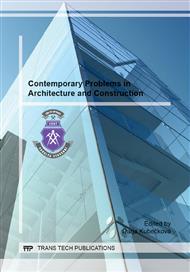p.823
p.827
p.834
p.839
p.844
p.849
p.854
p.859
p.865
Drinking and Waste Water Price Specificity Formation Process in the Republic of Armenia
Abstract:
In the article represented specificity`s price formation process strength of technical activity hydro social cycle in the Republic of Armenia.Analysis of drinking water consumption is done with respect to three groups: standpoint of interest domestic farms, especially in industry and farmers.Industry included all subjects of services and products maker in economy, which is not included in domestic farms or agriculture fields. Appear from industry field include for example: nitrogenous factory, power generation company, banks holding, railways, hospitals and the others.Drinking water supply and waste water derivations services have six important technical directions in hydro social cycle: water intake, drinking water conditioning, drinking water distribution, waste water collecting, waste water reconditioning and derivations:Here are calculated unit cost, overhead and cross costs for each process fabrication, and corresponding its we create hypothetical named average unit cost, as well as average overhead and cross costs.In the article we analyse, that we can improve water supply options in the domestic farms, industry and agriculture fields.
Info:
Periodical:
Pages:
844-848
DOI:
Citation:
Online since:
October 2014
Authors:
Keywords:
Price:
Сopyright:
© 2014 Trans Tech Publications Ltd. All Rights Reserved
Share:
Citation:


